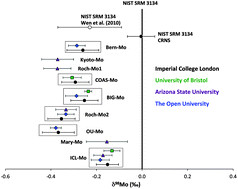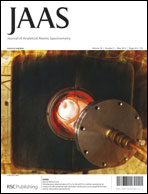Resolution of inter-laboratory discrepancies in Mo isotope data: an intercalibration
Abstract
The molybdenum (Mo) stable isotope system has been applied to a variety of geochemical and environmental problems. In the absence of a universally accepted zero-delta reference material, different groups report their data relative to their adopted in-house standards. Rigorous comparison of results generated in different laboratories using different analytical approaches is only possible if the in-house standards are of identical Mo isotope composition. To determine potential isotopic differences among various standards, the δ98Mo (98Mo/95Mo) values of ten Mo standard solutions were measured as part of this study. For six of these solutions, four laboratories carried out an intercalibration. In contrast to previous results, δ98Mo of various in-house standards were found to differ by up to 0.37‰. Renormalisation of our new and published Mo-isotope data available for seawater taken from various sites and the USGS rock reference material SDO-1 relative to NIST-SRM-3134, provides a much better agreement among reported δ98Mo values for these samples. Relative to NIST-SRM-3134, the δ98Mo of SDO-1 is 0.80 ± 0.14‰ (2s), while oxic, open-ocean seawater is characterised by an average δ98Mo of 2.09 ± 0.10‰ (2s). This intercalibration provides a solid platform for comparing and amending existing δ98Mo values. In addition, we recommend that future Mo isotope studies adopt NIST-SRM-3134 as a universal zero-delta reference material.


 Please wait while we load your content...
Please wait while we load your content...